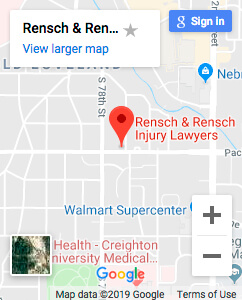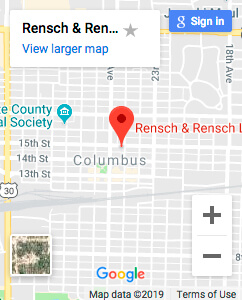Injured Workers Need Strong Advocates
 Gloria Montoya was willing to work hard. She immigrated to the United States from El Salvador in 2004 with a third grade education, taking jobs cleaning houses, sewing and working in a warehouse. Gloria could only work jobs which required physical labor. She also could not read, write, speak, or understand the English language.
Gloria Montoya was willing to work hard. She immigrated to the United States from El Salvador in 2004 with a third grade education, taking jobs cleaning houses, sewing and working in a warehouse. Gloria could only work jobs which required physical labor. She also could not read, write, speak, or understand the English language.
In 2005, living in Columbus, Nebraska, she accepted a position with Tyson Foods in Madison, Nebraska, on the line of a pork processing plant.
“She was using a hook and knife to flip pig bellies. This is something she did dozens of times an hour at the plant,” said Omaha Accident Attorney, Richard Rensch.
According to the Bureau of Labor Statistics, meatpacking is the nation’s most dangerous occupation. In 1999, more than one-quarter of the nation’s meatpacking workers suffered a job-related injury or illness. The meatpacking industry has not only the highest injury rate, but also has by far the highest rate of serious injury-more than five times the national average.
Rensch said as a result of repetitive motion, Montoya suffered serious injuries while working on the line of the plant.
“She ended up with chronic bilateral carpal tunnel syndrome and wrist and elbow tendonitis,” said Rensch. With constant numbness, swelling and tingling in both arms, Mrs. Montoya was in so much pain and discomfort, she could barely brush her own hair or cook simple meals for her family because the 51-year-old had lost the practical use of her arms. Her orthopedic surgeon held the opinion Mrs. Montoya should avoid future meatpacking work.
She did what’s recommended when there’s a workplace injury, she reported it to plant supervisors.
“It’s essential that an injured worker notifies their supervisor in person or in writing that they’ve been injured on the job. In a workers’ compensation case, workers have a limited amount of time to file a claim if they wish to seek damages for their injuries,” said Sean Rensch, Richard’s son and law partner.
After medical treatment, surgeries and two more years of trying various jobs at the meatpacking plant, Montoya was laid off from work at the Tyson plant, unable to hold any job there because of her disability. She sought the services of the Workers’ Compensation Attorneys at Rensch and Rensch Law.
“She needed someone to fight on her behalf. We took on her case and won Mrs. Montoya an award of permanent total disability against Tyson,” said Sean Rensch. Sean Rensch recounted the fact that Tyson mounted a vigorous defense and required the matter be tried. Tyson tried to make Mrs. Montoya look as though she voluntarily left her position and that work at Tyson was available for her. That just was not true.
After Rensch and Rensch Law successfully tried the case and won, Tyson appealed the Award four times – until the Nebraska Court of Appeals finally upheld Mrs. Montoya’s permanent disability award. Mrs. Montoya’s case against Tyson is reported in the Northwest Digest at the following cite: Montoya v. Tyson Foods, Inc., 041712 NECA, A – 11 – 624 (Neb. 2012)
http://www.leagle.com/decision/In%20NECO%2020120417325
Workers’ compensation law in Nebraska asserts that an employer or its insurer is responsible for benefits after your workplace injury. Many times this is not an easy avenue for an employee to maneuver, without the help of an experienced lawyer.
Rensch & Rensch Law attorneys have handled multiple cases against the various meat packers and will use that valuable experience to benefit you and your family. They recognize what is at stake when a working head of household is disabled, waiting for benefits and unable to return to his or her job. Our attorneys do not get paid unless and until the client receives their benefits.
Experienced personal injury attorneys can help you to navigate your claim through the worker’s compensation process, including working with employers, benefits providers, doctors, insurance companies, other attorneys and the workers’ compensation court.
Your job is an important part of who you are as a person. If you’re injured on the job, you most likely will need professional guidance and protection to help make you whole again and to regain the confidence and financial stability you and your family need and deserve.


